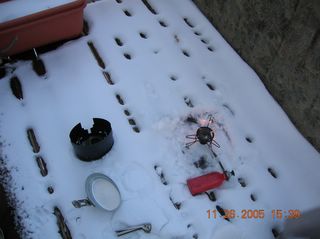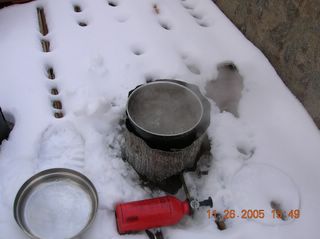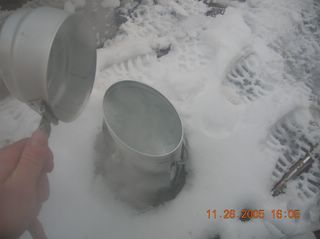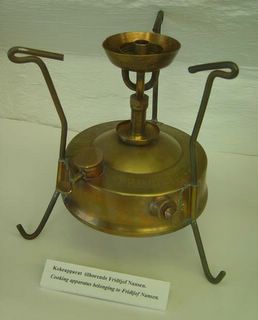I have reprinted James Howard Kunstler's "They Lied to Us!" below. Kunstler argues that we should not be so surprised that they lied to us about wmd for we ourselves are to blame for this. Although I do agree with him, I also think that the belated interest by the media in the Plame debacle, the recent closed door senate session by Harry Reid, and the call (by some) to begin fact finding proceedings towards impeachment all should be undertaken. I even think that we were not deceived by this, but let ourselves be "deceived" because we figured that the Bush-Cheney-Rumsfeld cabal would work things out, however strange it may seem, in our best interest. On an unconscious level we sort of struck a bargain within ourselves that went something like this: "yeah, I know the intelligence on wmd that they are presenting looks a little bit contrived and it happens to coincide with our deployment of troops in Afghanistan and yes we are pissed off about 9/11 so, well yes, this is probably a strategem to forward our resource interests in the middle east and our aims of global hegemony, SO Therefore I'll go along with this and WISH that it were true and maybe it IS true.....because indirectly it will benefit me as I am a citizen on the side of the hegemon (bully)" I think that deep in our heart we knew--all of us knew--that this war was unjustified and yet we wanted to see the shock and awe from our darkened rooms watching CSPAN knowing that our gas habit would be further secured by our military. I think we knew, you know, in our hearts we knew. And it was like Hume said, "Reason is the slave of the passions". All of our critical faculties were surrendered upon that hideous passion of ours to keep the addiction alive, to keep "globalization" moving forward, to believe that our American way of life had finally risen above the limits of nature. But I should mention that despite this, I think we should let ourselves go ahead and pretend we were "mislead" and go through with the proceedings and special hearings and so on and see how far we can go towards correcting our selves, just to see how bad it really was. Perhaps we will even get to watch an impeachment! Wouldn't that be grand!
Source: James Howard Kunstler, kunstler.com
October 31, 2005 The cry across the land grows increasingly shrill: "THEY LIED TO US!" For going on three years, the American public, especially on the political left, has been complaining that the Iraq War was some kind of a shuck-and-jive. The Bush government pulled the wool over everybody's eyes. They ran a vicious propaganda operation. We were fooled by all those fairy tales about WMDs, Saddam and Osama, and African radioactive yellowcake. Now, through the fog of the Valerie Plame affair and the indictment of Scooter Libby, the cry is reaching a crescendo: "THEY LIED TO US!" Being a Democrat myself, and therefore nominally in opposition to Bush-and-Cheneyism, one has to contend with all sorts of embarrassing nonsense emanating from one's own side. In Sunday's New York Times op-ed section, for instance, Nicholas Kristoff wrote: "Mr. Cheney, we need a stiff dose of truth." I'm sorry to tell you this Nick (and the rest of my homies), but what Jack Nicholson's character said in that court martial movie some years back still applies: you can't stand the truth. If the American public could stand the truth, we would stop calling it the Iraq War and rename it the War to Save Suburbia. Of all the things that Bush and Cheney have said over the last six years, the one thing the Democratic opposition has not challenged is the statement that "the American way of life is not negotiable." They're just as invested in it as everybody else. The Democrats complain about the dark efforts by Bush and Cheney to cook up a rationale for the war. Guess what? The Democrats desperately need something to oppose besides the truth. If they would shut up about WMDs for five minutes and just take a good look around, they'd know exactly why this war started. When the American people, Democrat and Republican both, decided to build a drive-in utopia based on incessant easy motoring and massive oil dependency, who lied to them? When tens of millions of Americans bought McHouses thirty-four miles away from their jobs in Boston, Atlanta, Minneapolis, and Dallas, who lied to them? When American public officials adopted the madness of single-use zoning and turned the terrain of this land into a tragic crapscape of strip malls on six-lane highways, who lied to them? When American school officials decided to consolidate all the kids in gigantic centralized facilities serviced by fleets of yellow buses that ran an average of 150,000 miles per year per school, who lied to them? When Americans trashed their public transit and railroad system, who lied to them? When Americans let WalMart gut Main Street, who lied to them? When Bill and Hillary Clinton bought a suburban villa in farthest reaches of northern Westchester County, New York, who lied to them? You want truth, Progressive America? Here's the truth: the War to Save Suburbia entailed an unavoidable strategic military enterprise. Saving Suburbia required that the Middle East be pacified or at least stabilized, because two-thirds of the world's remaining oil is there (and in case you haven't figured this out by now, Suburbia runs on oil, and the oil has to be cheap or we couldn't afford to run it). The three main oil-producing countries in the Middle East, going from west-to-east are Saudi Arabia, Iraq, and Iran. We had serious relationship problems with all of them at various times, and they with each other, leading at frequent intervals to a lot of instability in that region, and consequently trouble for us trying to run Suburbia on cheap oil (which they sold us in large quantities). After nineteen religious maniacs from the Middle East, mostly Arabs (though unaffiliated officially with any state in their actions) flew planes into our skyscrapers and a big government building, we had to kick someone's ass. We decided to start by kicking the ass of Afghanistan, where one particular mischievous maniac, Mr. bin Laden, had set up operations connected with 9/11. It wasn't enough. We never could find Mr. bin Laden, Afghanistan wasn't really in the Middle East, and whatever else they were, the Afghans weren't Arabs. We had to find somebody else's ass to kick to reinforce the idea that religious maniacs unaffiliated with any particular state could not pull off lethal stunts like 9/11 without bringing substantial pain down on their own home places. To put it plainly, we had to kick some Arab ass. We picked Saddam Hussein's Iraq. Not because he had anything to do with 9/11-- which we couldn't pin on any Muslim nation -- but because Saddam's Baathist regime was Arab, and the same general religious brand as the guys who did 9/11, Sunni Muslim, and because Saddam had already proven to be a freelance mischievous maniac quite in his own right over the years, worth getting rid of, and most of all (from a strategic point-of-view) because Iraq was the perfect place geographically to open a US police station in the Middle East. It was right between those two other troublemakers, Saudi Arabia and Iran, and setting up an American military presence between them, it was hoped, would moderate and influence their behavior, and discourage them from doing anything to interfere with the indispensable supplies of oil that we desperately required to run our beloved, non-negotiable Suburbia. It was even hoped, by a band of extreme idealists in the US Government, that in the process of setting up a military presence in Iraq, we could convert this troubled, fractious nation into a peaceful, cohesive, beneficent democracy, establishing a shining example, blah, blah. . . . But such is the nature of idealism. I apologize for taking two long paragraphs to tell you the true origins of the War to Save Suburbia, but it was, after all, only two paragraphs, and the truth is sometimes not so simple. The American people have gotten exactly the war that they bargained for. The outstanding obvious question is not by what wicked and recondite means the War to Save Suburbia got started, but how come once started, we did such a poor job of resolving it, specifically why, after nearly three years, our vaunted technological mastery couldn't get the electricity running more than a few hours a day in Baghdad, why we let squads of redneck moron enlisted personnel beat up on prisoners and videotape their own antics, and why we can't even get the oil equipment in good enough shape so the Iraqis can sell us the oil we still need to run our non-negotiable way of life? So, as a card-carrying Democrat and as a Progressive who would like to see his country successfully adapt to the changing realities of the world, I propose we stop making ourselves ridiculous by whining about being lied to, because we've only been lying to ourselves. We walked into the War to Save Suburbia with, as the old saying goes, our eyes wide shut.












